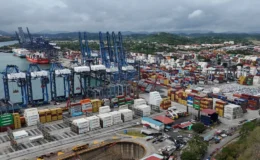Government openly addressing the need for a liveable working wage in Panama.
- By : James Bryson
- Category : Economy, Energy/Infrastructure, Financials, Human Interest, Infrastructure, Labor, Politics

On November 15, 2025, the National Government established the National Minimum Wage Commission , a tripartite body responsible for analyzing economic conditions and recommending new rates that will apply from January 2026.
The process is coordinated by the Ministry of Labor and Workforce Development (Mitradel) , as established in Executive Decree No. 12 of November 13, 2025. The working group must conclude its deliberations no later than December .
The commission is formed in accordance with Article 21 of Cabinet Decree No. 249 of 1970 , the organic law of the Ministry of Labor and Workforce Development (Mitradel). The National Council of Organized Workers (Conato) and the National Confederation of Independent Trade Union Unity (Conusi) participate on behalf of the labor sector .
The employer sector is represented by the National Council of Private Enterprise (Conep) , the Chamber of Commerce, Industries and Agriculture of Panama (Cciap) and the Panamanian Chamber of Construction (Capac) .
The Government’s representatives on the board are the Ministry of Commerce and Industries (MICI) , the Ministry of Economy and Finance (MEF) , the Ministry of Agricultural Development (MIDA) and the Ministry of Labor and Workforce Development ( Mitradel ) .
During the inauguration, the president of CONEP, Gabriel Diez Montilla , emphasized the importance of the process. In his words: “It will allow us to understand each other, engage in dialogue, propose solutions, reach consensus, and move forward. It’s no secret that the economic situation for households and businesses is far from ideal.”
“Just as we understand that many people don’t have enough to cover their families’ needs, many businesses, especially micro, small and medium-sized enterprises, are on the verge of financial sustainability,” he added.
Montilla emphasized that the country still faces significant labor challenges, including an unemployment rate exceeding 10% , representing more than 320,000 people , and approximately 700,000 workers in informal or underemployed conditions. “ They too must be part of this discussion and their needs must be taken into account ,” he stated.
He added that the minimum wage alone does not guarantee better income, emphasizing: “A minimum wage is not a solution in itself to a better salary. It is a starting point.” He also warned about the effects of automation and technology on employment.
His call was for the review to be “balanced and sustained ,” so that it does not lead to the loss of formal jobs or increase informality.
For her part, the Minister of Labor, Jackeline Muñoz , emphasized that the process must be evaluated responsibly. In her words: “More than 60 years have passed, which calls us to reflect and compels us to consider the transformation this process needs for the future.” She stressed the importance of upholding the Constitution, international agreements, and the Labor Code in a democratic process.
Muñoz reiterated that the minimum wage should not be seen merely as a number. “The minimum wage is not just a number. We can’t make empty promises about pennies or deaths. It’s a decision that impacts families, both those who currently have jobs and those who aspire to join and participate in the active labor market of this country.”
He pointed out that decisions should be based on technical reports and geared towards collective well-being.
On behalf of the labor sector, Aniano Pinzón , from CONATO, presented an assessment of the last few years. He stated verbatim: “In these three decades, the Gross Domestic Product has more than recovered, but minimum and market wages have barely grown in real terms, that is, in their purchasing power.”
Pinzón recalled that, in the last setting of the minimum wage, studies showed that a typical family needed around $1,800 per month to cover the basic healthy food basket.
“ This means that in a two-person household, the minimum wage should be $900 per month ,” he noted. He indicated that, at that time, the average minimum wage was $577 , implying a gap of 58% .
He also criticized the fact that the adjustments of 2024 and 2025, between 4% and 6%, have not been sufficient to cover basic needs such as food, education, health and transportation.
Regarding the aspirations of the working sector, he stated: “Our legitimate aspiration is to get closer to covering the full cost of that basket with the minimum wage, although we will not achieve that goal in one fell swoop.”
Pinzón insisted that the country does have the conditions to move forward. “So we can’t continue with excuses that there aren’t the economic conditions to do justice for the workers.”
He added that CONATO will seek an increase that brings wages closer to the real cost of living and proposed reducing wage tiers in different regions, simplifying rates, and moving toward a single national minimum wage. He concluded by stating that workers expect a “fair and equitable” increase .



No Comments